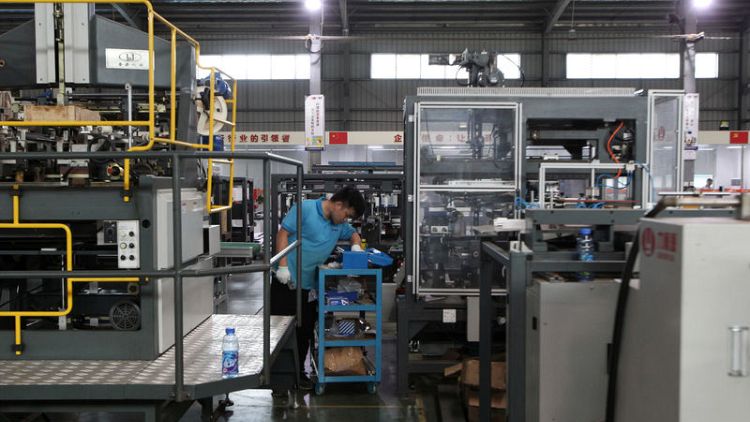By Jonathan Cable and Marius Zaharia
LONDON/HONG KONG (Reuters) - Factory activity contracted across Asia and Europe in July, fuelling worries a prolonged U.S.-China trade war and an economic slowdown could tilt the world towards recession, which central banks would have to fight with depleted ammunition.
Manufacturing activity in the euro zone fell at its steepest rate since late 2012 last month as demand sank, a survey compiled by IHS Markit showed, puncturing sentiment among factory managers.
Forward-looking indicators in Thursday's survey suggest manufacturing won't rebound anytime soon and is likely to embolden policymakers at the European Central Bank, who last week all but promised to ease policy further as the bloc's growth outlook deteriorates.
Earlier figures from Germany, Europe's largest economy, showed a recession among its manufacturers deepened. France and much of the rest of the euro zone also faltered.
"The manufacturing sector is going through some sort of correction, some of it due to trade uncertainty, some of it due to a slowdown in other countries," said Jacqui Douglas, chief European macro strategist at TD Securities.
"Some of the commentary ... is about the falling demand from Asia, so there is some sort of global phenomenon going on here where manufacturing is getting hit quite hard."
British manufacturers' output fell by the most in seven years last month, adding to signs the economy may slip into recession as businesses confront falling demand from Europe and China and the risk of a disruptive no-deal Brexit.
New Prime Minister Boris Johnson has promised to take Britain out of the European Union on Oct. 31, regardless of whether he can secure a revised transition deal with the bloc.
Other Purchasing Managers' Indexes showed manufacturing activity contracting in China for a second consecutive month, while export-driven economies in North Asia - Japan, South Korea and Taiwan - have been in pain for longer.
South Korea's exports, a bellwether for global trade, tumbled for an eighth straight month as an escalating political and economic dispute with neighbouring Japan painted an increasingly gloomy picture for Asia's fourth-largest economy.
Taiwan's streak of contraction reached its 10th month, while Indonesia's PMI fell below 50 for the first time in six months. Vietnam, Philippines and Thailand PMIs suggested mild growth.
In India, where the economy relies more on domestic demand, manufacturing growth picked up.
Data later in the day is likely to show U.S. factories maintained a modest expansion.
RATES FALLING
As expected, the Federal Reserve cut interest rates on Wednesday, but Chairman Jerome Powell said the move was not necessarily the start of a lengthy easing cycle. He also signalled, however, that the Fed might cut further.
The Bank of Japan and the ECB have signalled their readiness to ease, although they have less room to move than the Fed.
Expectations have grown that the BOJ's next policy move will be to ease, and the ECB is expected to cut rates in September, according to Reuters polls of economists.
In Hong Kong, the central bank cut its base rate for the first time in a decade, as its currency peg to the U.S. dollar forced the monetary authority to move with the Fed.
Central banks in Australia, India and Russia, among others, have also already loosened policy.
However, later on Thursday the Bank of England is unlikely to cut rates, even as the risk of a disorderly Brexit darkens growth prospects.
And while more stimulus from Chinese policymakers is expected, the People's Bank of China gave no sign of whether it will immediately follow the Fed's rate cut, as it has done on occasion.
In China, Asia's economic centre of gravity, the Caixin/IHS Markit Manufacturing PMI for July rose to 49.9 from 49.4 in June, remaining below the 50 mark dividing expansion from contraction.
The readings were largely in line with an official gauge that showed factory activity last month shrank at a slower-than-expected pace.
GRAPHIC: Asia manufacturing PMIs - https://tmsnrt.rs/2Mug4tD
U.S. and Chinese negotiators ended a brief round of trade talks on Wednesday with little sign of progress. They agreed to meet again in September.
The International Monetary Fund has warned their trade dispute will reduce global output by 0.2%. Many economists say any escalation could lead to a global recession.
"We expect that this downward trend in manufacturing will continue in 2019 until the trade and technology negotiations make some progress," said Iris Pang, Greater China economist at ING.
(Editing by Simon Cameron-Moore, Larry King)



